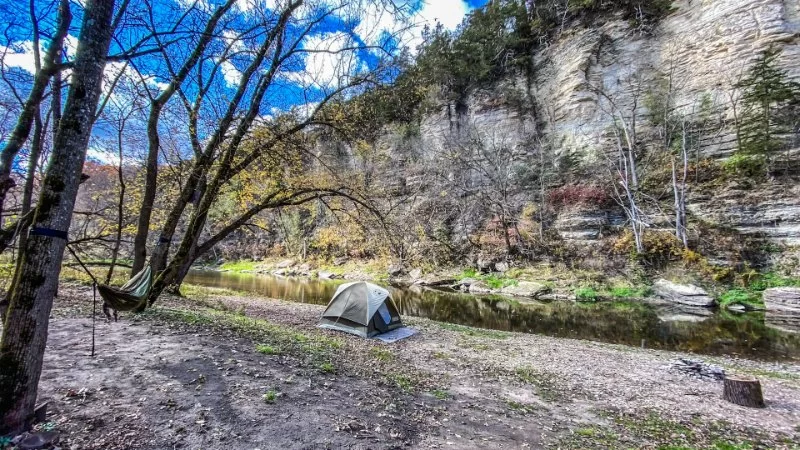Learn how to camp near folded bluff crests safely and comfortably with detailed tips, real stories, and expert guidance. Discover how to choose the right campsite, prepare for terrain challenges, and enjoy scenic views.

- Choosing-the-Right-Spot-Near-Folded-Bluff-Crests
- Understanding-the-Natural-Structure-of-Folded-Bluff-Crests
- Safety-Considerations-When-Camping-Near-Bluffs
- Preparing-Your-Gear-for-Bluffside-Camping
- Real-Experiences-from-Campers
- Why-This-Type-of-Camping-Is-Worth-It
Choosing the Right Spot Near Folded Bluff Crests
Learning how to camp near folded bluff crests isn’t just about finding a flat surface to pitch a tent. It’s about understanding terrain, reading natural formations, and knowing how to select a site that is both scenic and safe. Many American campers are drawn to bluffside zones for their breathtaking overlooks, peaceful atmosphere, and sense of seclusion.
When searching for a campsite, look for stable soil and avoid any areas close to the edge of the bluff. Folded bluffs can sometimes shift or erode more quickly than expected, especially after rain. Ensuring you stay several feet away from steep drop-offs is essential—even if the view seems tempting. Experienced travelers often recommend scouting sites during daylight to properly assess the surroundings before committing.
If you prefer curated suggestions or want assistance with nearby camping accommodations, Pine Cliff Resort often helps families and outdoor enthusiasts pick ideal sites with comfort and safety in mind.
Understanding the Natural Structure of Folded Bluff Crests
Folded bluff crests form through geological compression, creating layered, curved formations that rise dramatically above valleys and riverbeds. This rugged terrain offers some of the most spectacular views in the U.S., making it a favorite among hikers and campers. However, the same natural forces that create these landscapes also make them unpredictable.
1. Why Terrain Knowledge Matters
The layers of rock in folded bluffs may loosen over time due to water infiltration, temperature shifts, and root expansion from surrounding plants. Knowing this helps campers choose safe ground and avoid fragile or crumbling edges.
2. How Weather Impacts the Bluffs
Weather plays a huge role in bluff stability. Heavy rain can soften soil and cause small slides, while wind can impact campsite safety. Campers staying near crest lines should monitor conditions closely and prepare to relocate if the landscape becomes unstable.
3. The Benefits of Higher Terrain
Despite the challenges, these locations offer quiet nights, panoramic views, and abundant wildlife viewing opportunities. Many campers say the serenity found above the valleys is unmatched.
Safety Considerations When Camping Near Bluffs
Safety is extremely important when figuring out how to camp near folded bluff crests. Natural beauty can distract even experienced campers from the subtle hazards of bluffside locations.
1. Keep a Safe Distance from Edges
A common safety rule is to set up camp at least 15 feet from the bluff edge. This prevents accidental slips and protects you in case of minor soil erosion overnight.
2. Be Aware of Wildlife
Many bluffside environments are home to eagles, foxes, deer, and snakes. Store food properly to avoid attracting curious animals. Keep pets leashed and aware of their surroundings.
3. Check Weather Before and During Your Trip
Windstorms can be stronger near elevated areas. Ensure your tent is anchored securely and avoid camping near tall, unstable trees.
Preparing Your Gear for Bluffside Camping
Proper preparation ensures a more comfortable and enjoyable outdoor experience. Because bluffside environments can be windy, uneven, and exposed, gear selection matters more than usual.
1. Choose a Low-Profile Tent
Low-profile tents withstand wind better and stay more stable in exposed areas. A footprint beneath the tent also helps protect the base from rocks and debris.
2. Pack Lightweight Cooking Equipment
Open flames should be used cautiously near bluff vegetation and windy zones. Many campers prefer small, wind-resistant stoves for safety and convenience.
3. Bring Navigation Tools
Bluff crests can be disorienting in fog or low light. Maps, GPS tools, and reliable headlamps reduce the risk of losing your path.
Real Experiences from Campers
One traveler shared how setting up camp near a folded bluff overlooking a river became one of their most peaceful vacations. They described waking up to golden sunbeams spreading across the valley and hearing hawks gliding over the cliffs. However, during the second night, unexpected winds swept through, forcing them to reinforce tent stakes and stay alert. This experience taught them the importance of preparation and awareness.
Another family recalled visiting a bluffside area after a light rainstorm. As they walked the crest, they noticed fresh cracks near the edge—a clear reminder that weather can rapidly change terrain conditions. Fortunately, they adjusted their campsite farther inland and enjoyed a relaxing weekend in a safer location.
Why This Type of Camping Is Worth It
Camping near folded bluff crests offers a unique opportunity to enjoy dramatic scenery, quiet surroundings, and an elevated sense of adventure. The views during sunrise and sunset alone can make the entire journey unforgettable. For those seeking tranquility combined with exploration, bluffside locations are hard to beat.
For curated guidance, access to safe campsite zones, and comfortable lodging options nearby, many U.S. travelers rely on Pine Cliff Resort to help plan their outdoor experiences. Whether you're new to camping or a seasoned explorer, professional insight improves both safety and satisfaction.
US Forest Services National Acctng
9317 TX-75, New Waverly, TX 77358, USA
Visit Location PageBoulder Lake Campsite #3
Boulder Lake Rd, Duluth, MN 55803, USA
Visit Location Page